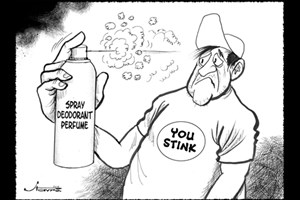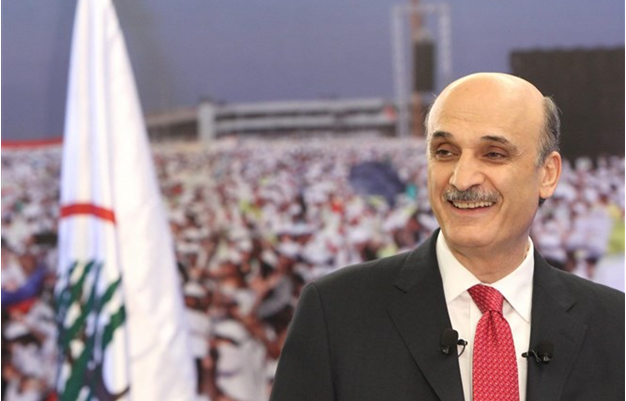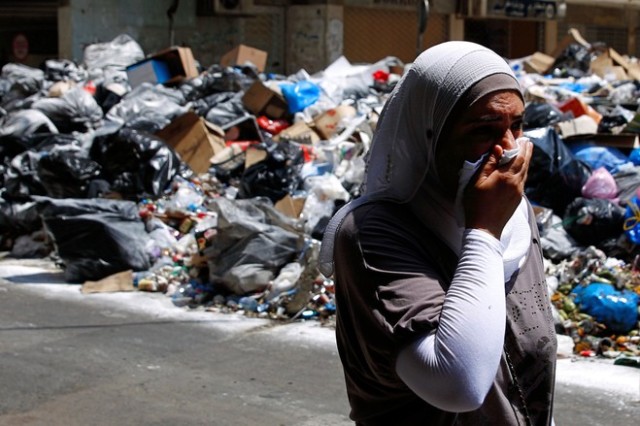Trash has been piling up in the streets of Beirut for nearly two months. This weekend violence erupted in the Grand Serail in central Beirut with the Army rushing in with water cannons to quell the crowds; dozens were reported injured. An alleged non –sectarian activist group “You Stink” is directing its ire at the government, which lacks a President, usually a Maronite Christian in the confessional political system of Lebanon. The Sunni premier, Tammam Salam is under fire, as Cabinet Ministers rejected new tenders to end the trash dispute.
Noteworthy is the alliance between Hezbollah’s and the Christian Maronite group Lebanon Forces are suggesting that a new government be elected, despite the postponement of a national election till 2017. Such is the topsy turvy politics in Lebanon’s enigmatic political system, given the overarching problems of contending with Hezbollah involvement in the Iranian regime backed alliance with Syria’s Assad. The Lebanese trash crisis gives new meaning to the well tuned phrase by 19th Century American journalist, Charles Dudley Warner: “politics make strange bedfellows.” Despite the alleged resilience and durability of the Lebanese confessional political system, could failure to obtain new tenders for the removal of stinking piles of trash on the streets of Lebanon’s cities result in Hezbollah emerging as the eminence grise behind a new government in Beirut?
Reuters has the latest developments in the roiling trash dispute turned violent, “Lebanese ministers walk out of meeting over garbage crisis:”
The powerful Shi’ite party Hezbollah and its Christian allies walked out of an emergency Lebanese cabinet meeting on Tuesday in protest at a proposed solution to a garbage disposal crisis that has ignited violent protests in Beirut.
The national unity government led by Prime Minister Tammam Salam also canceled a tender to select new refuse collection firms, underscoring the difficulties it faces overcoming the crisis that has brought popular calls for it to step down.
Public anger that has come to a head over the trash crisis turned violent at the weekend, with scores of protesters and security forces injured. Salam has threatened to resign, expressing frustration at the failings of his cabinet, which groups Lebanon’s rival parties.
Failure to agree a solution to the crisis has laid bare wider political stagnation in Lebanon, where sectarian and power rivalries have been exacerbated by Syria’s four-year-old conflict.
Ministers including members of Hezbollah and Christian politician Michel Aoun’s Free Patriotic Movement walked out of Tuesday’s emergency meeting, the information minister said.
Hezbollah in a statement slammed the “mounting and worsening corruption” it said the garbage crisis reflected.
A government statement released after the walkout said tenders announced on Monday to award contracts for waste disposal to private companies had “included high costs”, and had therefore been rejected.
Media reports and activists had accused the cabinet of awarding the contracts to a number of companies based on regional and political affiliation, reflecting alleged corruption and politicization of the issue.
The government said that as a temporary measure rubbish, which has festered on the streets of Beirut, would be tipped in Akkar province in north Lebanon, in return for a $100 million “sum” that would go toward development projects in that region.
The information minister said it was the proposed sum that triggered the walkout. Akkar, one of the poorest regions in Lebanon, is mostly Sunni but also has many Christian areas.

“You Stink” Cartoon. Source: The Daily Star, Beirut
Worsening problems emerge in the trash crisis.
Beirut-based activists from the “You Stink” campaign held two large rallies over the weekend and a smaller march on Monday, with calls for a solution to the rubbish crisis quickly turning into calls for the cabinet to resign.
Protest organizers have called on Lebanese at home and abroad to join them in a large rally on Saturday.
Lebanon’s army commander General Jean Kahwaji said late on Monday the armed forces would protect any peaceful demonstrations but would not tolerate “security violators or infiltrators” who sought to sow “sedition and chaos.”
Organizers of protests, which began peacefully, have blamed the violence on troublemakers whom they say are connected to rival sectarian parties. The U.N. special coordinator for Lebanon on Monday urged “maximum restraint” by all sides.
Calm has prevailed since the weekend clashes, however, and later Tuesday, workers were removing concrete blast walls erected the day before outside the cabinet headquarters which protesters had covered with colorful anti-government graffiti.
The protest campaign, which has mobilized independently of the big sectarian parties that dominate Lebanese politics, blames political feuding and corruption for the failure to resolve the crisis that has left piles of uncollected garbage stinking in the scorching sun in recent weeks.
The cabinet and parliament are deadlocked, and politicians have been unable to agree on a new president for more than a year while Syria’s war next door has aggravated sectarian tensions and driven more than one million refugees into the country.
The Salam cabinet, formed last year with the blessing of regional rivals Saudi Arabia and Iran, has avoided a complete vacuum in the executive arm. It brings together Sunni Muslim former Prime Minister Saad al-Hariri’s Future movement, Shi’ite Hezbollah and Christians.

Dr. Mordechai Nisan
But it has struggled to take even basic decisions and tension in cabinet has escalated over appointments in the security agencies and army.
This latest crisis comes as we are about to publish in the September edition of the NER a book review and interview with Dr. Mordechai Nisan, a well published author lecturer and respected Israeli expert on Lebanon and minorities in the Middle East. In our interview with Nisan we asked a question about the survivability of the 80 year confessional political system in Lebanon. Here is the exchange:
Gordon: Did the assassination of Lebanese PM Hariri and the Cedars Revolution of 2005 spell the demise of the confessional system in Lebanon?
Nisan: The durability of Lebanon’s confessional political system remains in place. It is both traditional and consensual that the President be a Maronite, the Prime Minister a Sunni Muslim, and the Speaker of the Legislature a Shiite Muslim. These arrangements have persevered for some 80 years as an organic model for the special case of Lebanon.
In our review of his latest book, Politics and War in Lebanon: Unraveling the Enigma, we noted Nisan’s concluding commentary set against the background to the present political crisis:
With a vacant presidential post and parliamentary elections postponed until 2017, trouble looms for the country caught up in the vicissitudes of the Syrian civil war spilling over its borders bringing a flood of refugees and a roiling trash crisis.Nisan wrote about a hopeful sign, “The March 14 camp asked Patriarch Beshara a – Ra’I to suggest names for the presidential post. Maybe somehow two Maronites –patriarch and president would help save the country from oblivion.” The expression in Hebrew is, Alevai. Its English meaning, “That should only be.”





